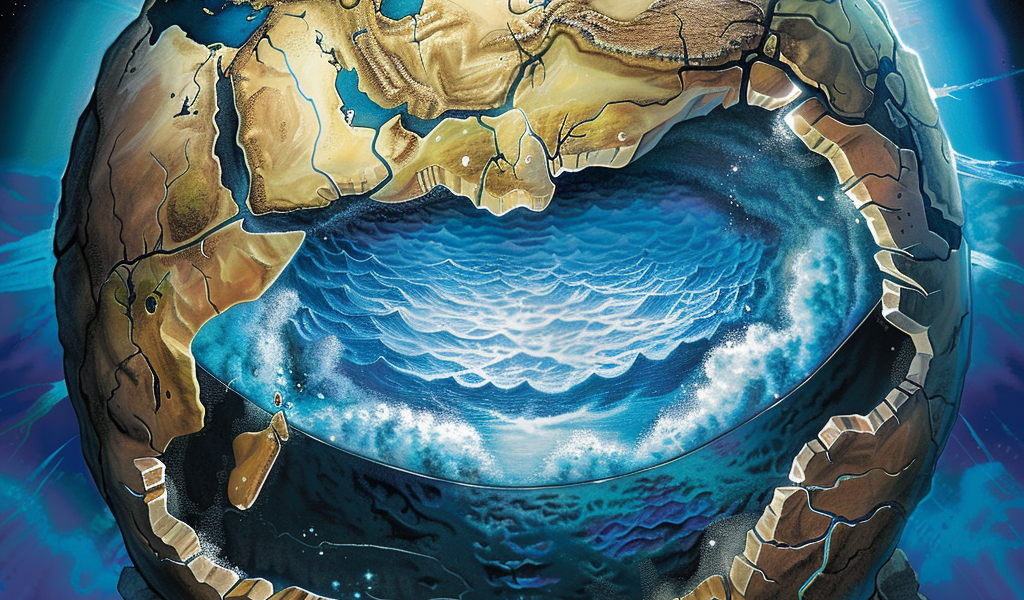In a groundbreaking discovery, scientists have revealed the existence of a massive ocean located beneath the Earth’s crust, containing more water than is found on the planet’s surface. This remarkable finding adds to a series of astonishing scientific revelations that have captivated the public’s imagination in recent months.
Recent advancements in geophysical research have confirmed that approximately 400 miles beneath our feet lies a significant reservoir of water trapped within a mineral known as ‘ringwoodite.’ This mineral has unique properties that allow it to retain water in a sponge-like state, which is neither liquid, solid, nor gas, but rather a distinct fourth state of matter.
The initial discovery regarding the water-storing capabilities of ringwoodite was documented in a scientific paper titled ‘Dehydration melting at the top of the lower mantle’, published in 2014. The research highlighted that the Earth’s mantle contains an astonishing amount of water, potentially three times greater than that found in all of the Earth’s oceans combined.
Geophysicist Steve Jacobsen, one of the researchers involved in this groundbreaking study, explained the significance of ringwoodite’s crystal structure. He stated, “The ringwoodite acts like a sponge, soaking up water. Its unique crystal structure enables it to attract hydrogen and trap water effectively, which indicates that this mineral can hold substantial amounts of water deep within the mantle.”
Jacobsen further elaborated on the implications of this discovery, suggesting that it might provide insights into a whole-Earth water cycle. He emphasized, “We are finally seeing evidence for a whole-Earth water cycle, which could help explain the vast amounts of liquid water present on the surface of our habitable planet. Scientists have been searching for this elusive deep water for decades.”
The findings emerged from extensive research involving the analysis of seismic waves generated by earthquakes. By employing advanced seismometers, scientists were able to detect shockwaves traveling beneath the Earth’s surface, leading them to the conclusion that these waves were interacting with water held in the ringwoodite mineral.
To put the scale of this discovery into perspective, if ringwoodite contains just one percent water, it would suggest that the volume of water stored beneath the Earth’s crust is three times greater than that of the oceans. This revelation has profound implications for our understanding of the planet’s geology and hydrology.
In addition to this monumental finding regarding subterranean water, researchers have also uncovered new ecosystems previously unknown to science. Utilizing underwater robotics, scientists have explored volcanic crusts, revealing diverse forms of life that thrive in extreme conditions, showcasing the vast and largely unexplored biodiversity of our planet.
This recent flurry of scientific discoveries has sparked widespread interest and debate among researchers and the general public alike. From the identification of a black hole threatening our galaxy to the discovery of a missing continent and even a hole in the sun, the scientific community is abuzz with revelations that challenge our understanding of the universe.
Moreover, ongoing research continues to unveil critical information about human biology and the natural world. For instance, studies have indicated that individuals who live beyond the age of 90 exhibit key differences in their blood, while other research suggests that our reality may be akin to a computer simulation.
As scientists delve deeper into the Earth’s mysteries and the cosmos, the potential for new discoveries seems limitless. Each revelation not only enhances our understanding of the planet we inhabit but also raises important questions about the nature of existence and the universe at large.
With every new finding, we are reminded of the intricate and interconnected systems that govern life on Earth and beyond. The quest for knowledge continues, as researchers strive to uncover the secrets that lie beneath our feet and in the vastness of space.





